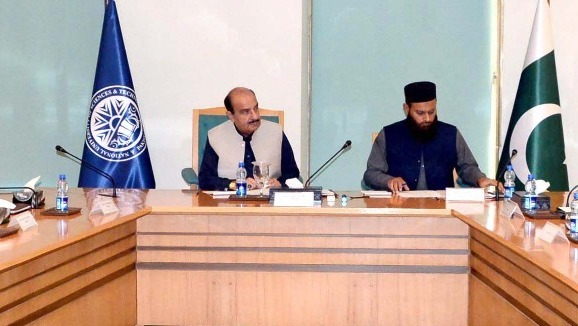The Senate Standing Committee on Science & Technology held its session at the National University of Sciences and Technology in Islamabad under the chairmanship of Senator Kamil Ali Agha. Senators Dr. Afnan Ullah Khan, Nadeem Ahmed Bhutto, Husna Bano and Muhammad Aslam Abro attended while Rector Dr. Muhammad Zahid Latif briefed the committee on university affairs.
The Rector outlined NUST’s growth since its establishment in 1991, noting the university offers 168 degree programs across seven disciplines to around 20,000 students. The faculty strength stands at 1,296, with 68 percent holding PhDs, 47 percent foreign qualified and 29 percent female. NUST’s standing in the QS World Rankings 2025–2026 was highlighted as sixth in South Asia, 67th in Asia and 371st globally.
Data presented from the 2017 census shows the student body is concentrated regionally: 61.02 percent from Punjab, 11.56 percent from Khyber Pakhtunkhwa, 9.69 percent from Islamabad, 8.38 percent from Sindh, 3.1 percent from Azad Jammu and Kashmir, 2.59 percent from Balochistan, 2.24 percent from Gilgit-Baltistan and 0.38 percent international. The chairman voiced concern at the heavy representation from Punjab and urged steps to improve provincial balance while the Rector reiterated that admissions at NUST are strictly merit based.
The Rector said NUST conducts entry tests across Pakistan and provides more than 1,000 scholarships to students from families earning below Rs. 40,000 to help widen access. He also warned of acute financial stress, explaining that government allocations of roughly Rs. 4 billion fall far short of total annual expenditure exceeding Rs. 12 billion, which includes an annual electricity bill of about Rs. 1 billion.
Specific concerns about the NUST Balochistan campus were raised, with the Rector reporting an annual loss near Rs. 30 million and unpaid scholarships for 200 students despite commitments from the Balochistan government. The committee directed that the Chief Secretary of Balochistan and the head of the Balochistan Education Endowment Fund be summoned to the next meeting and instructed NUST to arrange preparatory classes for students from underprivileged provinces to improve their chances in entry tests.
Responding to the shortage of residential facilities for female students, the committee recommended that NUST prepare and submit a proposal for inclusion in the upcoming Public Sector Development Programme to fund new girls hostels. The committee also noted that constrained revenues have hampered the university’s ability to offer competitive salaries, contributing to rising faculty resignations.
Another pressing issue discussed was sewerage water from adjacent areas passing through university grounds. To address this and other campus concerns, the committee decided to form a sub-committee to engage with the Capital Development Authority on matters including sewerage containment, water supply, land lease and usage, and construction NOCs. The Senate panel urged coordinated action to protect campus infrastructure and ensure equitable access for students across provinces, reinforcing the committee’s call for timely remedies at NUST.











